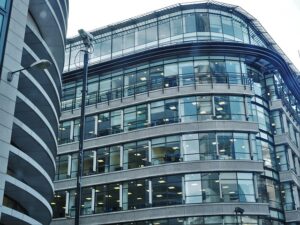Your business is growing successfully and you’re ready to scale up. It’s time to move on up to London. Fast-paced, full of potential… it’s a city of endless opportunities. Exciting times, right?
Whether you’re a financial services provider in the City, a tech start up in Kings Cross, or a growing consultancy in Soho, the challenges of scaling up in London are real. Our capital city offers massive possibilities, but the overheads, competition, and sheer complexity of doing business here can trip up even the most ambitious entrepreneur.
So, what are the actual costs of scaling a London-based SME? Being prepared and having a solid business plan will help you to ride that London wave. Let’s take a look at what’s involved.

What’s the difference between business growth and scaling?
The terms are often used interchangeably, but they actually mean different things. When you grow a business, it gets bigger and revenue increases, but it usually needs more resources to achieve that. For example, you secure five new clients, but you need to hire two more staff to handle the increased workload.
Scaling, on the other hand, is about increasing revenue without a significant increase in cost. You’re building systems, automating processes, and finding efficiencies that let you do more with less. Your profits increase faster than your expenses. Perhaps you invest in high impact new technology that makes operations more streamlined and productive. Output increases without the need for more employees.
In a high-cost, high-competition city like London, scaling’s often the smart route. You don’t want to keep adding costs just to stay afloat. Instead, focus on economic growth by making each pound, each person, and each process go further.
What are the challenges and costs associated with scaling up a business in London?
We’re not just talking overpriced cappuccinos (don’t expect much change from a fiver) or sandwich (you’ll be lucky to find one for a fiver). There are essential business costs that scale up businesses will need to cover.
A key challenge for scale up businesses is that your costs go up before your revenue catches up. That seriously impacts cashflow. You’ll need to do some smart financial planning to accommodate this.
Salaries
 In London, attracting top talent doesn’t come cheap. The average salary in London is around 20–30% higher than the UK average. In sectors like finance, tech, and creative, that can be even higher. Then you need to add employer National Insurance, pensions, plus perks like private healthcare, wellbeing benefits and so on.
In London, attracting top talent doesn’t come cheap. The average salary in London is around 20–30% higher than the UK average. In sectors like finance, tech, and creative, that can be even higher. Then you need to add employer National Insurance, pensions, plus perks like private healthcare, wellbeing benefits and so on.
Here’s an example. If you’re a legal secretary in Central London, you’ll be on around £50k. But just down the road in the South East suburbs, it would be £28,000. That’s a massive salary hike with only 4 miles distance between jobs. Think for a minute about the hefty salaries an experienced leadership team would be after.
Property costs
London office space is among the most expensive in Europe. If you’re eyeing a move from the suburbs, or even your home office, prepare for price shock. West End offices can reach £100-150 per sq ft. Before you sign a 5-10 year lease, check the fine print. How often can rent go up? What are you committing to?
Then there are the higher, but essential, costs for facilities management, security and utilities. Don’t forget business rates which are higher in London than elsewhere in the UK. It all adds up.
Post-pandemic, the demand for flexible, hybrid-friendly workspaces has soared. Not only does it suit new working patterns, but it means you only pay for the space that you’re actually using. Look at serviced or co-working spaces like WeWork, Huckletree, or The Office Group. They allow for flexibility as you grow with a more short-term lease commitment. That may be a more financially viable solution than taking on a property.
Transport
 I can wax lyrical about the time-saving benefits of the Elizabeth Line for hours. But while there’s no shortage of London transport options, it doesn’t always run smoothly. Those inefficiencies can be challenging for your business.
I can wax lyrical about the time-saving benefits of the Elizabeth Line for hours. But while there’s no shortage of London transport options, it doesn’t always run smoothly. Those inefficiencies can be challenging for your business.
If you’re scaling a product-based business in London, logistics can quickly become a headache. Think congestion charges, ULEZ fees, and restricted delivery windows. These logistics can impact your supply chain and profit margins. Those same fees will impact your initial moving costs too.
Location
Even up and coming London areas like Walthamstow or Acton aren’t cheap. You need to weigh up the benefits of London neighbourhoods to justify the cost of locating there. Will you build a stronger business network by being in Shoreditch/ Soho/ Mayfair? Your location may mean you’re in the right place at the right time to clinch a game-changing deal.
Consider costs vs investments
I find it helpful to distinguish between outright costs and those that are investments. What’s the difference? A cost is an expense that will be used now or soon. With an investment, you spend money to generate future benefits or returns.
Costs meet a current need. Things like replacing a printer cartridge or putting fuel in your van. But upgrading your clunky, slow IT system with a time-saving new one is an investment. Training your staff to streamline operations or offer an additional service is an investment. A well-researched marketing initiative can generate a healthy return on investment. You get the idea.
You can’t get away from necessary costs, but you should try to minimise them. Investments, on the other hand, add value to your business and are to be encouraged.
Moving on up to London?
 If you’re one of the UK scale-up success stories, I congratulate you.
If you’re one of the UK scale-up success stories, I congratulate you.
Recent research reports high growth in UK scale-ups, with a 43% average revenue increase per annum over the past three years. That’s more than double the OECD benchmark. Impressive eh?
Start ups and scale ups are central to the UK’s innovation ecosystem and play a hugely important part of the UK economy. Just look at the transformation of areas in East London, for example. Hoxton and Shoreditch aren’t only full of baristas and designers. Now, there’s Silicon Roundabout, or Tech City, which is all about tech entrepreneurs and start ups. Kings Cross is brimming with new business. Even Canary Wharf isn’t only home to big banks now.
One of the wonders of London is its dynamic evolution. It’s an exciting place, full of opportunities. You could be a part of that vibrant buzz, but you need to factor in the higher costs of operating in London. Look to maximise expenses that are investments, over those that are simply costs.
If you’re entering a high-growth stage; if you’re looking to scale up; a business coach like me could be the sidekick you need right now to keep you accountable. Need an intervention to keep you on track and prevent financial mistakes? Call me
Follow me on LinkedIn for more business tips and advice.




